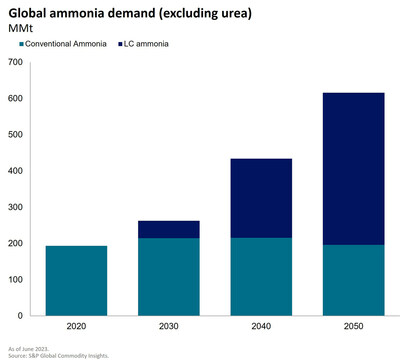Ammonia Market to Triple by 2050 with Nearly All Growth Coming from Low-Carbon Supply
- The global market for low-carbon ammonia is expected to triple by 2050, driven by decarbonization policies and incentives.
- Global trade of ammonia is expected to increase nearly ten times over by 2050, reaching 160 million metric tons.
- The Americas, the Middle East, and Australia are expected to emerge as major exporters of low-carbon ammonia.
- 'Blue' ammonia is expected to be more economically attractive than conventional production before 2030 in some key markets.
- The development of certification and classification systems will harmonize international trade of low-carbon ammonia.
- 'Green' ammonia produced from renewable electricity will require further policy support to be cost competitive in most markets.
Global ammonia trade expected to increase ten-fold as demand for low-carbon ammonia used for shipping fuel and power generation transforms market
"Decarbonization policies, including incentives in the
The new strategic report, Low-carbon Ammonia: Facilitating the Transition to a Sustainable Future says that the potential use of low-carbon ammonia as a marine bunker fuel, industry feedstock and as a carrier for hydrogen used in power generation represents a profound shift for the industry—from one geared primarily towards fertilizer production to one driven by energy markets.
S&P Global Commodity Insights expects global trade of ammonia to increase nearly ten times over by 2050 (160 million metric tons) as a result. While most ammonia is currently consumed on-site to produce other products that are then traded, low-carbon ammonia will more often be traded as a commodity in its own right. The
"The rapid growth in ammonia driven by low-carbon supplies will change the current market beyond recognition," said Ryan Monis, Director, Chemical Consulting, S&P Global Commodity Insights. "The diversification of supply routes and demand applications will introduce carbon capture, renewables, power utility and shipping market participants to an industry currently dominated by fertilizer producers."
The current pipeline of low-carbon ammonia projects for power generation—with owners consisting of public utilities, oil and gas majors, investment funds and others—illustrates the shift towards a broader group of market participants, the analysis says. Joint ventures between renewable energy producers, hydrogen producers and ammonia producers can also be expected to emerge.
While decarbonization policies have provided an irreversible momentum for low-carbon ammonia, several factors will be key in determining the ultimate composition of the market, the analysis says.
S&P Global Commodity Insights expects 'blue' ammonia (hydrocarbon-based production coupled with carbon capture and storage) to be more economically attractive than conventional production in some key markets before 2030 due to a combination of carbon emissions penalties and production subsidies. However, 'green' ammonia (produced from renewable electricity) will require further policy support beyond the incentives already announced to make it cost competitive in most markets.
Other points of high potential impact on the development of the market include the development of certification and classification systems to harmonize international trade; greater clarity from some major markets regarding acceptable emissions thresholds for hydrogen and ammonia in their decarbonization plans; and the pace of innovation and efficiency improvements for ammonia's use in power generation, the analysis says.
"Despite some policy and technological uncertainties remaining, it is now clear that the fundamental economics of low-carbon ammonia have been transformed," said Monis. "We expect the number of projects reaching Final Investment Decisions to accelerate significantly in the coming years, not only in production capacity but also in the associated infrastructure required to take the low-carbon ammonia market from concept to reality."
In addition to the new strategic report, S&P Global Commodity Insights has also introduced a new Monthly Low-carbon Ammonia Report service. Produced by Fertecon, the fertilizer analysis team at S&P Global Commodity Insights and the leading provider of data and insights for ammonia for more than 40 years, the new monthly report offers a regular and recurring market analysis that provides business intelligence and short-term forecasts for the low-carbon ammonia market as an individual sector. For more information about the new Monthly Low-carbon Ammonia Report, visit: https://www.spglobal.com/commodityinsights/en/ci/Info/0423/lowcarbonammonia.html
Additional Ammonia Resources from S&P Global Commodity Insights:
Ammonia - Chemical Economics Handbook
Ammonia Fertilizer Market and Price Analysis
Interactive: Ammonia Price Chart
Media Contacts:
Jeff Marn +1-202-463-8213, Jeff.marn@spglobal.com
Global/EMEA: Paul Sandell + 44 (0)7816 180039, paul.sandell@spglobal.com
Americas: Kathleen Tanzy + 1 917-331-4607, kathleen.tanzy@spglobal.com
Asia: Melissa Tan + 65-6597-6241, melissa.tan@spglobal.com
About S&P Global Commodity Insights
At S&P Global Commodity Insights, our complete view of global energy and commodity markets enables our customers to make decisions with conviction and create long-term, sustainable value.
We're a trusted connector that brings together thought leaders, market participants, governments, and regulators and we create solutions that lead to progress. Vital to navigating commodity markets, our coverage includes oil and gas, power, chemicals, metals, agriculture, shipping and energy transition. Platts® products and services, including leading benchmark price assessments in the physical commodity markets, are offered through S&P Global Commodity Insights. S&P Global Commodity Insights maintains clear structural and operational separation between its price assessment activities and the other activities carried out by S&P Global Commodity Insights and the other business divisions of S&P Global.
S&P Global Commodity Insights is a division of S&P Global (NYSE: SPGI). S&P Global is the world's foremost provider of credit ratings, benchmarks, analytics and workflow solutions in the global capital, commodity and automotive markets. With every one of our offerings, we help many of the world's leading organizations navigate the economic landscape so they can plan for tomorrow, today. For more information visit https://www.spglobal.com/commodityinsights.
![]() View original content to download multimedia:https://www.prnewswire.com/news-releases/ammonia-market-to-triple-by-2050-with-nearly-all-growth-coming-from-low-carbon-supply-301873382.html
View original content to download multimedia:https://www.prnewswire.com/news-releases/ammonia-market-to-triple-by-2050-with-nearly-all-growth-coming-from-low-carbon-supply-301873382.html
SOURCE S&P Global Commodity Insights
FAQ
What is driving the growth of the low-carbon ammonia market?
How much is global trade of ammonia expected to increase by 2050?
Which regions are expected to be major exporters of low-carbon ammonia?
Which type of ammonia is expected to be economically attractive before 2030?









